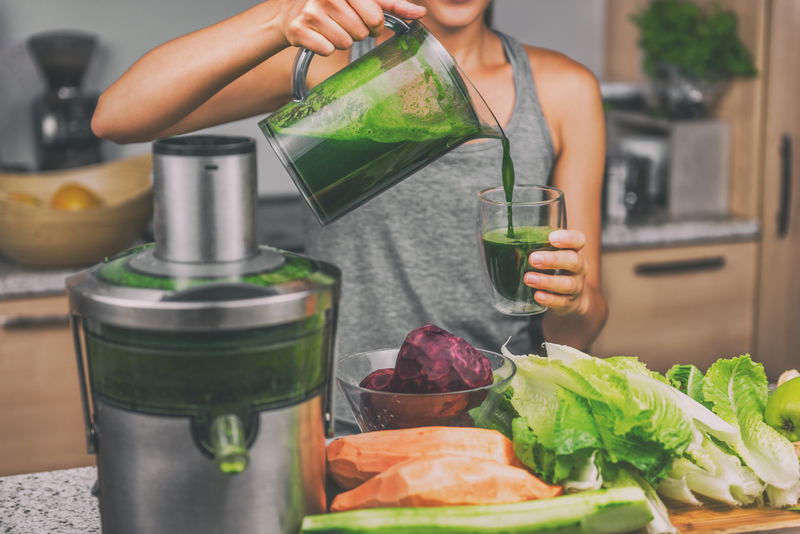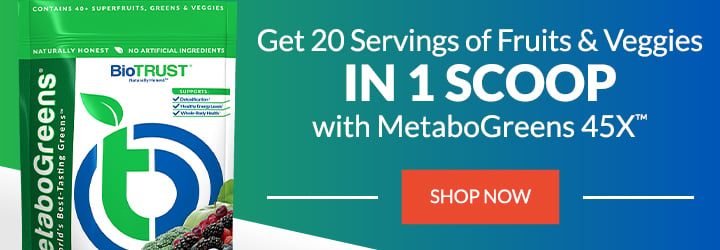Is Juicing Good for Weight Loss? See the Science

If there’s one thing virtually everyone loves, it’s a shortcut. Finding a new route to the grocery store that cuts the trip in half or finding a workflow tool that dramatically decreases the time to get a job done. And juicing for weight loss is often touted as a fast, easy way to lose weight.
Some proponents suggest you can even drop a full clothing size within days. Yet as you likely already know, if it sounds too good to be true, it probably is. And while juicing for weight loss may help you drop a few pounds rapidly, it also comes with some controversy and drawbacks.
What is Juicing for Weight Loss?
Juicing is simply the process of extracting the liquids from fruits and vegetables to discard the solids. It can be done with a hand juicer (as when juicing a lemon for a recipe). However, it’s more often done with a motorized juicer that quickly removes the skin, seeds, and pulp (i.e., fiber) from the whole food. This leaves behind a concentrated liquid that’s rich in nutrients and antioxidants yet low in bulk, including fiber that fills you up.
Juices for weight loss are typically made up of a variety of vegetables and fruits, including apples, beets, carrots, celery, oranges, spinach, wheatgrass, and other highly nourishing plant foods. Many also add herbs and spices like turmeric, ginger, parsley, and garlic to boost both the flavor and the nutrients the juice provides.
What are the Benefits of Juicing?
Some proponents suggest juicing helps “detox” the body. However, there is no research that demonstrates that replacing solid fruits and vegetables with their juiced forms actually detoxifies.
Others suggest that juicing is a great way to increase the plant nutrients in the diet. While juices do provide an abundance of nutrients, consuming only juices is neither a healthy nor sustainable way to lose weight and keep it off.
Juicing for Weight Loss Methods
You can find several different types of juice diets. Perhaps the most common is the juice fast. This diet replaces whole-food meals with juiced fruits and vegetables, often organic and raw, and dramatically drops the number of calories consumed.
Most of these fasts last for only two or three days. Because calories are dropped so low, they can be an effective way to drop weight quickly—at least for the short term. Others can last 10 to 14 days. But the longer you’re on a juice fast, the more dangerous it can become, especially for people who are insulin resistant, diabetic, or may have an eating disorder. 1
Juicing for Weight Loss Claims and Drawbacks
Juice cleanses are said to help the body detoxify and kickstart your weight-loss journey. Again, because they are usually so low in calories (often under 1,000 calories per day), it’s only natural that they help the weight come off quickly.
It’s also true that some people find rapid results on the scale provide more motivation to stick to their diets. 2 And one small study found that people who juiced for three days lost an average of around two pounds. Juice cleanses may also result in positive changes to the gut microbiome. 3
Most of that scale change, however, is due to water and possibly lean mass loss rather than any fat loss. So, despite claims to the contrary, juices can’t help you better burn fat for fuel to help decrease belly fat. They aren’t magic.
- Headaches
- Dizziness
- Weakness
- Nausea
- Fainting
- Fatigue
- Irritability
- Intense hunger (or feeling hangry)
- Sudden drops in blood pressure
- Nutrient deficiencies
- Increased risk of infections
Plus, because these diets only last a few days to a couple of weeks, once you add back in solid foods and start eating “normally” again, the weight will quickly come back unless you change your diet. In fact, that’s one of the biggest drawbacks of juicing for weight loss: the weight is typically regained just as quickly as it’s lost.
And it’s very difficult to maintain a juice diet for long. Because you are consuming little to no solid foods—especially those that fill you up and keep you satisfied for longer, like fiber and protein—most people find they’re super hungry.
During a juice fast, you’ll also be denying yourself a wide range of foods and the pleasure you can get from them. This can increase your stress levels, which may lead to overeating or, worse, potentially binge eating and an unhealthy relationship with food. 4
For this reason, it’s important to avoid a juice fast if you:
- Suffer from blood sugar issues (including insulin resistance, diabetes, and hypoglycemia)
- Are pregnant or nursing as your baby needs calories and nutrients to grow
- Are on specific medications or have a chronic medical condition—seek the advice of your doctor before considering juicing to lose weight
- Are recovering from surgery or an injury
- Suffer from kidney or liver issues
- Have anemia
- Have low blood pressure
- Are immunocompromised
Juicing is also not recommended for infants, young children, and the elderly.
Fiber and protein both help keep you satisfied and reduce appetite, even when following a lower-calorie diet. Foods higher in these satiating foods (e.g., dairy products, eggs, legumes, nuts, oats, and rye) have been found to be easier to sustain in numerous studies, which should help promote long-term results. 5,6 In addition, consuming enough fiber has been shown to promote heart health, regulate blood sugar, and help promote a healthy microbiome.
Juices are typically high in liquid carbohydrates, which research has found don’t fill you up as well as solid foods. 7,8 Fiber, for instance, has been shown to reduce appetite as it helps slow down how long it takes food to move through the stomach, so it takes longer to digest. 9 Chewing and digesting whole foods has also been shown to increase the satiety hormones, again helping you feel fuller for longer.
Many juices are made up of high-sugar fruits and vegetables like apples, pears, berries, beets, and carrots, which are also more likely to raise blood sugar levels once the fiber has been removed. This can increase insulin resistance and make it more difficult for the body to break down fats, especially if they’re consumed without foods that help slow digestion and blunt a surge in blood sugar, such as those rich in protein, fiber, or fat.
In addition, with a juice cleanse, calories are often dropped very low. Many people find their metabolism has slowed because the body feels like it’s starving. So, the body wants to maximize its use of every calorie, which hinders weight loss. Worse, now that the metabolism is slower, the body will often seek to hold onto, rather than burn, reserved fuel storage (i.e., body fat) and breakdown lean mass for fuel instead. This makes it harder to lose weight in the long run.
In addition, on a juice fast, you’re also missing out on other important macro- and micronutrients, such as vitamin B12 and protein. If continued, this could ultimately lead to nutrient deficiencies. On rare occasions, regular, prolonged juice fasting may also build up levels of an antinutrient called “oxalate,” which can stress the kidneys and impede mineral absorption in susceptible people. 10
BREAKING: US Doctor: “Eating This Every Day Can Snap You into Ketosis”
Is Juicing Good for Body Detox?
So, what about claims that a juice cleanse can help the body detox? It is true that we are exposed to toxins every day, and due to societal changes, toxins in our environment are increasing. For example, food often contains trace levels of herbicides, pesticides, and other chemicals. We’re exposed to higher levels of plastics and other chemicals from everyday cleaning products, packaging, and even skincare products. Most of us are also exposed to alcohol and pharmaceuticals and even tobacco from time to time.
Fortunately, our bodies were designed to naturally remove toxins through urine, feces, respiration, and sweat. Fiber is also an important nutrient for helping shuttle wastes and toxins out of the body. And while we are experiencing greater exposure, there’s no evidence that juice cleanses can help remove those toxins better than eating a healthy whole-food diet, drinking plenty of water, and decreasing our exposure to the most obvious offenders, like oven cleaners, air fresheners, and fabric softeners.
Are There Any Benefits to Juicing for Weight Loss?
If you’ve already been making changes to your diet—whether a big overhaul or just reducing the calories consumed—there are some benefits to juicing. For example, juicing may help:
- Improve hydration as juices provide fluids.
- Boost vitamin and mineral consumption as they’re often high in these nutrients. For example, blueberries (and blueberry juice) are high in vitamins C and K, while mangos (and mango juice) are rich in vitamins A and B6, and spinach provides a good dose of vitamins A, C, and E.
- Provide a rich supply of antioxidants.
- Increase nutrient variety since many of these are loaded with a range of healthy ingredients.
- Green juices, made with cabbage, kale, spinach, and celery, may also help balance electrolytes to support your active lifestyle.
- Encourage the consumption of more vegetables and fruits, which also supports improved gut health.
Getting a daily dose of vegetables and fruits is essential. They help boost natural energy levels, improve digestion, decrease the risk of disease, and more. And in today’s busy world, sometimes it’s easier to drink them than eat them. So, it makes sense that juices that are rich in more vegetables than fruits can be part of a healthy diet—as long as they fit into your daily calories and don’t take you over. Just keep in mind that juices can be calorie-dense—200 to 500 added calories per day, depending on the juice. Of course, consuming too many calories will lead to weight gain, even if they come from vegetables and fruits.
For perhaps the best of both worlds, you can also make your own juice in your blender (rather than a juicer) and include the whole fruit. This keeps the fibers, which will provide a more satiating as well as refreshing and hydrating drink. Some flavorful options include:
- Fennel, grapefruit, apple, and avocado (with some ice and perhaps sweetened with stevia)
- Pomegranate seeds and orange that’s perfect for fall
- Kale, blackberries, and a ripe banana
- Celery, spinach, apple, and ginger root
- Beets, raspberries, and strawberries
- Watermelon and raspberries
- Specific juices, like celery and beet, also appear to provide unique benefits.
To make your weight-loss juice more satisfying, consider turning it into a smoothie. By adding proteins and fats from protein powder, yogurt, avocado, chia seeds, MCT oil, and more, the smoothie has more staying power, to help you stick with your healthy eating plan for the long haul to lose weight and keep it off.
Juicing could be part of a sound nutrition strategy by delivering a range of nutrients easily. But exclusively juicing for weight loss can only provide short-term results made up of water and potentially metabolism-boosting muscle rather than long-term fat loss. Unfortunately, juicing for weight loss is far from the promised shortcut for weight loss.








